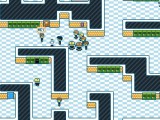On The Love Letter
 I want to take the time to briefly celebrate the spectacular achievements of a minigame currently (and very, very deservedly) making the rounds in the video gaming blogosphere. The game in question is axcho and knivel?s Flixel game The Love Letter. (Go on, open the link and play the game right away. Do it! Just get back here once you’re done.) The Love Letter deserves to be played because it manages to grasp something of the Real ™, of the very nature of human interaction, in a way that is rarely observed in video games.
I want to take the time to briefly celebrate the spectacular achievements of a minigame currently (and very, very deservedly) making the rounds in the video gaming blogosphere. The game in question is axcho and knivel?s Flixel game The Love Letter. (Go on, open the link and play the game right away. Do it! Just get back here once you’re done.) The Love Letter deserves to be played because it manages to grasp something of the Real ™, of the very nature of human interaction, in a way that is rarely observed in video games.
In addition, The Love Letter is also a little marvel of economy in design: Not only does it very convincingly, effortlessly and fluidly tie in a) setting, ![]() narrative exposition and c) gameplay to each other, it also manages to use them, co-operatively, in conveying to (and thus actually reproducing in) the player emotions such as pressure, hurry, constraint, annoyance and relief.
narrative exposition and c) gameplay to each other, it also manages to use them, co-operatively, in conveying to (and thus actually reproducing in) the player emotions such as pressure, hurry, constraint, annoyance and relief.
With an amazing absence of complexity to boot. We are talking about an itsy-bitsy one-room, one-button five-minute minigame about arriving late to school, finding a love letter stashed in your locker, and setting out to find whomever wrote it.
Super KISS.
I do need to take a quick detour to point out how there exists a reason why school-based fictions are popular among kids, teens and adults alike. We all know the reason, too: Kindergartens, schools and universities are all human terraria, aquaria, and sometimes even shark tanks. Schools are distilled humanity in a bottle. They have everything. Interaction. Integration. Relationships. Groups mechanisms. Power relationships. Knowledge.
 …Stupidity. Etcetera etcetera.
…Stupidity. Etcetera etcetera.
In this respect, it?s almost surprising to note that compared to television or movies, for instance, very few western video games are actually set in school. (One might speculate that this follows from the utter inappropriateness, detestability and loathsomeness of school violence and bullying; in other words, it’s extremely difficult if not impossible for developers to incorporate the most common forms of VG gameplay (BANG! KAPOW! SPLURT!) into a school setting. Rockstar, soulless as they are, were able to do even that, in the form of Bully.)
 In Japan, it could be said, the school topos seems to me more popular than in the western world, as lots of anime, manga and video games deal with the concept in more (or less) creative ways – I?m immediately thinking of the prevalence of romance simulators, the Persona series, and for a really mainstream example, Final Fantasy VIII.
In Japan, it could be said, the school topos seems to me more popular than in the western world, as lots of anime, manga and video games deal with the concept in more (or less) creative ways – I?m immediately thinking of the prevalence of romance simulators, the Persona series, and for a really mainstream example, Final Fantasy VIII.
The point is simply this: School life is inherently reproducible, repeatable, and most importantly, relatable. It?s the one shared experience that we all have as human beings – sans being born, and dying, maybe, if only those two weren’t so inherently unrelatable.
Back to The Love Letter and its three axes of setting, narrative and gameplay. What makes the game rise above its peers is its masterful marriage of these three axes to the fourth component that I mentioned at the very beginning of the post:
Emotional response.
 Again, the game?s premise couldn?t be simpler: Read your love letter before next class begins. End of story. The whole set-up has extreme implications, though, due to the way the situation is framed. You MUST read the letter in its entirety to discover the writer’s identity; otherwise your opportunity to meet your potential love interest will vanish in a heartbeat. Given that you were absent during the day?s very first class, you know your schoolmates WILL now be eager to see what “SUP!”. Doubly so, should they catch you red-handed with a love letter!
Again, the game?s premise couldn?t be simpler: Read your love letter before next class begins. End of story. The whole set-up has extreme implications, though, due to the way the situation is framed. You MUST read the letter in its entirety to discover the writer’s identity; otherwise your opportunity to meet your potential love interest will vanish in a heartbeat. Given that you were absent during the day?s very first class, you know your schoolmates WILL now be eager to see what “SUP!”. Doubly so, should they catch you red-handed with a love letter!
Gosh! You simply CANNOT let anyone find out what you?re reading, or you might be to subjected to ridicule – or worse still, put the other person in an equally compromising position. This is a massively believable, relatable scenario.
I am not in the least implying the need for fictions to be realistic in order to be successful, or to adhere to real-world conditions (this is all nonsense); I am, however, trying to illustrate the way in which The Love Letter manages to make great use of verisimilitude, or the varying adherence of a media product to our shared set of expectations.
Therefore, it is not only the game’s successful pairing of gameplay WITH narrative (this would be ludonarrative harmony/dissonance, if you want to go there); it’s also the developer’s clever utilization of our shared understanding of all the various topoi, the generic conventions, that come pre-packaged specifically with school life as a distillation of social interaction on the whole. In other words, everything about the game’s narrative, setting and gameplay work hand-in-hand to underline and emphasise the situation player is projected into.
Social life, as we know, is performative, and if you perform well, you’ll be awarded certain rewards based on your successes. (This is why we gamers dread gamification so much. We don’t want MORE performativity in our lives.) The be-all, end-all of human social reward, of course, is love. Love as the final and only reward for your performance. Beyond elegant!
 As the school clock counts down to the beginning of your next class, with the chances of uncovering your secret admirer dwindling down with each passing second, right as you?re being forcibly swarmed by your curious, well-meaning classmates, you really do begin to observe in yourself a feeling of chaotic haste, of pressure, even distress, as well as a marvellous annoyance and indignation towards the kids crowding you – all out of their very real human interest towards you as a social being in a social situation. With this, the game has just become a simulation, in some ways evoked the exact kind of feelings and emotional responses that a situation such as this would in the real world.
As the school clock counts down to the beginning of your next class, with the chances of uncovering your secret admirer dwindling down with each passing second, right as you?re being forcibly swarmed by your curious, well-meaning classmates, you really do begin to observe in yourself a feeling of chaotic haste, of pressure, even distress, as well as a marvellous annoyance and indignation towards the kids crowding you – all out of their very real human interest towards you as a social being in a social situation. With this, the game has just become a simulation, in some ways evoked the exact kind of feelings and emotional responses that a situation such as this would in the real world.
I?ve not yet mentioned how the game is controlled, but even that makes perfect sense: The protagonist simply moves towards wherever the mouse cursor is being pointed – in a very free-floating manner, no less, as if swimming in a sea of students, further contributing to the metaphor of school (life) as aquarium. The letter, then, is read simply by pressing down the left mouse key – again, an action that needs no further explication.
In less than five minutes (that is, if you’re successful in finding your love interest), The Love Letter manages to grasp something of reality in a way that is incredibly artful; and by this I refer to the ability of distilling a vision of reality – as it is experienced by human beings – into an artefact; something tangible, touching and shareable.
Startling, fresh, yet somehow understandable. Something gained.
The game has depth beyond its apparent simplicity, too. In its subtle, pixelated way, the game hints towards the protagonist being something of an outsider; only you, the player, have had your hair dyed black. You… and your secret love interest! Bang! Two more tropes – the soulmate, and the outsider – are introduced and combined ever-so-subtly and sweetly, to provide more motivation still, should the player still require more.
Though simplistic both outwardly and functionally, The Love Letter is jam-packed with meaning. It just so happens that we are so deeply familiar with its conventions, and that it happens to convey all its meanings so elegantly, that without specific reading glasses on, we in a sense fooled into experiencing a very tangible psychological reward in the form of a little bit of annoyance. This is the game’s greatest achievement.
At the end of the day, The Love Letter achieves all this simply by positing to the player a very simple observation of reality: That human interaction in a social setting can be a challenge.
(That, and how love is sometimes attainable – against all odds – with a tiny bit of perseverance. Which will always and forever be darned cute.)



0 Comments
Recommended Comments
There are no comments to display.